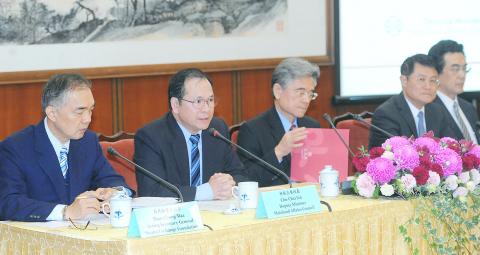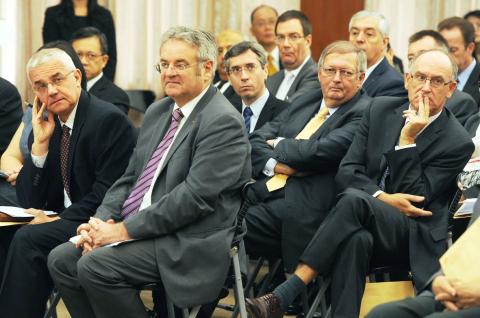The APEC leaders’ summit in Beijing this year would be the most suitable occasion for a meeting between President Ma Ying-jeou (馬英九) and Chinese President Xi Jinping (習近平) because it would allow China to interpret the gathering as a “domestic affair,” Mainland Affairs Council (MAC) Deputy Minister Lin Chu-chia (林祖嘉) said.
Lin made the comment at a meeting of foreign envoys at the Ministry of Foreign Affairs in response to a question EU Representative to Taiwan Frederic Laplanche raised about a possible Ma-Xi get-together. The meeting was to brief the envoys on the agreements on meteorological cooperation and earthquake monitoring signed during the 10th high-level cross-strait talks on Feb. 27 in Taipei.
Several envoys inquired about the possibility of a Ma-Xi meeting, a topic discussed when MAC Minister Wang Yu-chi (王郁琦) met with China’s Taiwan Affairs Office Minister Zhang Zhijun (張志軍) on Feb. 11 in Nanjing, China.

Photo: Wang Min-wei, Taipei Times
“As the next APEC summit is to be held in Beijing, it would help create a context where both sides of the Taiwan Strait could have their own interpretation of the nature of the meeting,” Lin said.
The Democratic Progressive Party (DPP) was quick to criticize his comments.
DPP spokesman Lin Chun-hsien (林俊憲) questioned Ma’s eagerness to meet with Xi, saying that Ma should prioritize the nation’s economy above everything else, including his place in history.

Photo: Wang Min-wei, Taipei Times
DPP Legislator Chen Chi-mai (陳其邁) called on Lin to step down.
“Which country does Lin work for? Is the Ma administration really so desperate to meet with Xi … that it is willing to hand over Taiwan’s sovereignty?” Chen said.
The council later said that a Ma-Xi meeting would not be an international or domestic affair, but a “cross-strait one.”
“The government remains adamant that such a meeting must not undermine the nation’s dignity and stances on sovereignty issues, and could only be held in a way that is conducive to the advancement of social well-being and cross-strait rapprochement,” the council said.
Zhang dismissed Lin’s suggestion when questioned by reporters on the sidelines of the 12th National People’s Congress in Beijing.
“We should find another place [for a meeting], since it only concerns the two sides of the Strait, and during which only cross-strait matters will be discussed. It is not necessary to meet at an international occasion,” he said.

MAKING WAVES: China’s maritime militia could become a nontraditional threat in war, clogging up shipping lanes to prevent US or Japanese intervention, a report said About 1,900 Chinese ships flying flags of convenience and fishing vessels that participated in China’s military exercises around Taiwan last month and in January last year have been listed for monitoring, Coast Guard Administration (CGA) Deputy Director-General Hsieh Ching-chin (謝慶欽) said yesterday. Following amendments to the Commercial Port Act (商港法) and the Law of Ships (船舶法) last month, the CGA can designate possible berthing areas or deny ports of call for vessels suspected of loitering around areas where undersea cables can be accessed, Oceans Affairs Council Minister Kuan Bi-ling (管碧玲) said. The list of suspected ships, originally 300, had risen to about

DAREDEVIL: Honnold said it had always been a dream of his to climb Taipei 101, while a Netflix producer said the skyscraper was ‘a real icon of this country’ US climber Alex Honnold yesterday took on Taiwan’s tallest building, becoming the first person to scale Taipei 101 without a rope, harness or safety net. Hundreds of spectators gathered at the base of the 101-story skyscraper to watch Honnold, 40, embark on his daredevil feat, which was also broadcast live on Netflix. Dressed in a red T-shirt and yellow custom-made climbing shoes, Honnold swiftly moved up the southeast face of the glass and steel building. At one point, he stepped onto a platform midway up to wave down at fans and onlookers who were taking photos. People watching from inside

Japan’s strategic alliance with the US would collapse if Tokyo were to turn away from a conflict in Taiwan, Japanese Prime Minister Sanae Takaichi said yesterday, but distanced herself from previous comments that suggested a possible military response in such an event. Takaichi expressed her latest views on a nationally broadcast TV program late on Monday, where an opposition party leader criticized her for igniting tensions with China with the earlier remarks. Ties between Japan and China have sunk to the worst level in years after Takaichi said in November that a hypothetical Chinese attack on Taiwan could bring about a Japanese

The WHO ignored early COVID-19 warnings from Taiwan, US Deputy Secretary of Health and Human Services Jim O’Neill said on Friday, as part of justification for Washington withdrawing from the global health body. US Secretary of State Marco Rubio on Thursday said that the US was pulling out of the UN agency, as it failed to fulfill its responsibilities during the COVID-19 pandemic. The WHO “ignored early COVID warnings from Taiwan in 2019 by pretending Taiwan did not exist, O’Neill wrote on X on Friday, Taiwan time. “It ignored rigorous science and promoted lockdowns.” The US will “continue international coordination on infectious